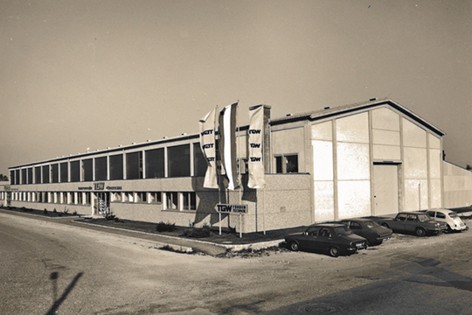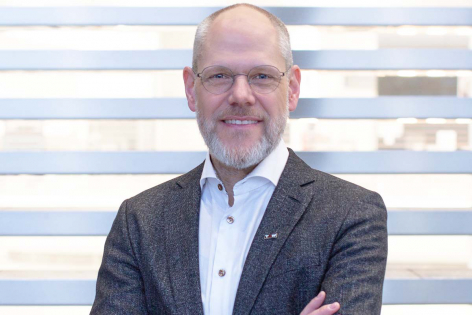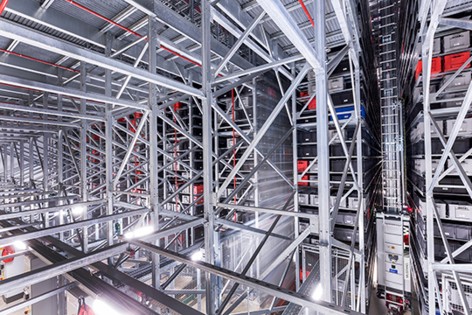In an interview on the occasion of the 50th anniversary of the TGW Logistics Group, CEO Harald Schröpf talks about the company's successful development, the focal points in research and development and the future challenges for the Austrian company with its long history.
TGW celebrates its 50th anniversary in 2019. What are your thoughts about this?
Harald Schröpf: Many people have made significant contributions to the success of TGW, first and foremost our founders, Ludwig Szinicz and Heinz König. When they took over a small fitter´s shop in Wels in 1969, they laid the foundation for an intralogistics success story. In the beginning, TGW (whose name comes from an abbreviation of the German "Transportgeräte Wels") had ten employees and produced magazine carriages, wheelbarrows and heavy-load carriers. The first conveyor belt in the company's history was developed for an Austrian online retailer in 1970. This was the initial impetus for the focus on intralogistics. The decades that followed saw many ground-breaking developments: the first TGW storage and retrieval machine, the Stingray Shuttle and FlashPick®, the one-stop solution for automated split case picking, just to name a few.

How has TGW developed in the past five decades?
TGW expanded internationally and doubled its annual sales to 719.6 million euros within a few years. We have been consistent in entering new markets and are focused on Europe, the USA and China. The number of employees has also grown steadily. We currently have a staff of 3,600 specialists from 69 nations working in Europe, Asia and North America. As a widely diversified company, we have been one of the major players in intralogistics for years now.
How has the perception of TGW in the industry changed?
A crucial step in our successful development was the transition from being strictly a supplier of mechanical systems to a systems integrator. For many years, TGW has been perceived and valued in the industry as a supplier of high-quality, reliable mechatronics components. Today, we function primarily as a general contractor, planning and implementing highly complex logistics centres around the world – and we also ensure that the systems perform reliably and as promised. For this purpose, we have built up a great deal of expertise in solution planning, in the software area and in customer service. In recent months, many international customers have commissioned TGW with automating their intralogistics. In 2019, we concluded a contract with sporting goods specialist Puma in the hundreds of millions of euros, one of the largest in our company's history.

What role do research and development play?
Traditionally, innovations have always been incredibly important to us. TGW has recently increased its research and development budget by more than 16 percent to a total of 28 million euros in the past business year. We invest nearly four percent of turnover in research and development. That is a high figure. We continue to pursue this path – with focal points in the fields of robotics and digitalization. By doing so, we provide answers to the challenges many of our customers face and position ourselves as a technological leader in the robotics and automation field.
Artificial intelligence and cognitive systems are future-oriented concepts that TGW is putting a great deal of effort towards. The technologies are already being used in Rovolution, our intelligent, self-learning picking robot. Furthermore, our specialists have developed a so-called digital twin of Rovolution: a complete digital representation which is connected to the physical installation in real time and grows with it. The digital twin makes the decisions and movements of the robot visible, comprehensible and predictable. With its help, we can analyse data, learn from it and visualise it by means of 3D models. This means that it is possible to do a lot more than just monitor the current condition. The replay function allows our experts to look back at the past in order to detect causes for errors. For example, they can predict when certain maintenance work will have to be performed. Users benefit from optimum transparency, increased productivity and lower operating costs.
What effects do these innovations have on the intralogistics industry?
Thanks to new technological opportunities, for example in robotics or digitalisation, it is possible to respond to customer requirements that have been difficult to fulfil in the past. The companies that utilise these opportunities skilfully will be the only ones that succeed. The importance of e-commerce will also continue to grow. Thanks to our system solutions, we are very well positioned in this segment. But even if e-commerce were to account for 20 percent of our entire consumption volume – and right now we are far away from that – 80 percent of purchases would still be processed by our sales locations. This is also a huge market with great potential.

A foundation owns TGW. What does this mean for TGW?
Our late founder Ludwig Szinicz, who passed away in 2017, wanted to ensure that even after he stepped down from overseeing day-to-day operations, TGW would remain a stable and independent company. This is why he founded the TGW Future Private Foundation back in 2004 and transferred all his shares in the TGW Logistics Group to this foundation. His intention in doing so was to ensure that the company's future would be secured for the long term and see to it that TGW would carry on operating in accordance with his philosophy "Focusing on People – Learning and Growing".
As a foundation company, TGW cannot be sold. Two-thirds of profits stay in the company and are invested. This means that TGW is both a reliable employer and a stable partner for its customers and suppliers. The Future Wings initiative initiates and supports charitable projects that are focussed primarily on education and vocational training for young people.
Where do you see the challenges and the future prospects for TGW?
It is important to identify the opportunities of the future and draw the right conclusions from them. A very high degree of automation plays an absolutely central role in TGW solutions. We want to help our customers become even faster and more efficient. Automating workflows and processes also provides an answer to the challenges of e-commerce and the associated omni-channel approach – as well as the increasing difficulty in finding employees in many industries. TGW develops its solutions to be intelligent and flexible enough that the systems can master unforeseen changes in customer behaviour at any time. TGW is in a very good position. We can look forward to the next 50 years with optimism.
Mr. Schröpf, thank you very much for the interview.

